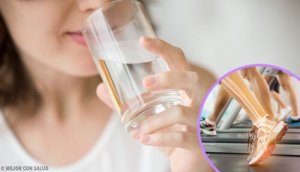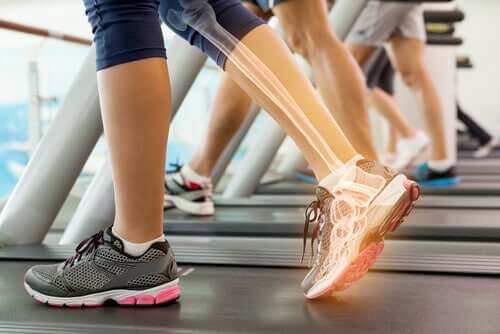Ten Consequences of Not Drinking Enough Water


Written and verified by the doctor Nelton Abdon Ramos Rojas
Your vital organs, like your brain, liver, and heart are mostly water. Consequently, drinking too little water can damage anything from your skin to your organs.
Indeed, water is vital for your bones and even the spaces between your cells. In this article we’ll show you ten consequences of not drinking enough water.
The consequences of not drinking enough water
1. Dehydrated skin
Along with moisturizing creams and other natural treatments, the best solution for keeping your skin hydrated is drinking enough water. Your skin’s elasticity depends on having adequate water balance: you should drink as much or more than you lose. To find out if your skin is dehydrated, try the following test:
- Gently pinch an area of your skin and see how long it takes to return to its normal state.
- If you’re dehydrated, your skin will very slowly return to its original shape. Otherwise, it will bounce back right away.
You can also test the temperature of your skin, especially your face. Typically, the body needs plenty of water to maintain an ideal temperature. So, if your skin is hotter than usual, you might need to increase your water intake.
Discover: Six facial masks for dry skin
2. Constipation

Constipation makes it difficult to have normal bowel movements. One of its main causes is not drinking enough water. When your intestines form stool, the large intestine removes a lot of water to solidify waste.
This is because dehydration makes it more difficult to remove solid waste and can lead to abdominal pain.
Hemorrhoids are directly related to constipation. They’re caused by your intestine’s efforts to remove very solid or dry stool.
3. Muscle cramps
Muscle cramps are typically associated with physical activity. However, they can be related to any other situation where your body is low on water.
What typically happens is that – in the presence of insufficient fluid levels in the body – you end up with an imbalance in your supply of electrolytes and minerals. These components are vital for the proper function of your muscles.
This is why it’s a good idea to stay hydrated when playing sports or doing exercise. As a result, you lose water and minerals through your sweat.
4. Fatigue strikes as a consequence of not drinking enough water

Not drinking enough water directly affects your daily life and can cause fatigue. When you don’t have enough fluids, your cells slow down their activities and generate less energy.
People who suffer from dehydration are often tired and sleepy for this reason. Fortunately, the effects of fatigue can be reversed if you start drinking water.
- It’s also a good idea to eat fruits and vegetables that contain plenty of water to increase the amount of fluid in your body.
- In addition to providing you with vitamins, fruits like watermelon and citrus fruits contain natural sugars that increase your energy levels.
Additionally, there are those who recommend drinking a glass of water as soon as you get up, to start hydrating the body from the very first moment. Thus, instead of enjoying our morning coffee or breakfast, you should drink a glass of water to get your spirits up and start your activities with enthusiasm.
5. Dry mouth
Problems with dry mouth are often associated with oral hygiene and proper digestion. The best advice when you have dry mouth is to drink water immediately.
Symptoms of dry mouth:
- Dry and rough tongue
- Thick saliva
- A sticky or dry sensation
- Difficulty chewing, tasting, or swallowing food
- Pain or burning in the mouth or tongue
- Cracking in the lips or at the corners of the mouth
6. Migraines
Most of the time, migraines are associated with dehydration. When you don’t drink enough water it causes your blood vessels to dilate, which produces intense headaches.
Remember that dehydration doesn’t only occur on days with high temperatures. As long as you drink enough water, you’ll maintain an adequate balance. As such, you’ll have less of a chance of getting a migraine.
7. High blood pressure
Not drinking enough water reduces the blood volume in your blood vessels when ideally, they should be full. To keep your organs functioning under conditions of dehydration, your body releases a histamine hormone.
As a result, your veins and arteries contract which leads to an increase in your blood pressure. In addition, drinking plenty of water improves your circulation, reducing the build-up of toxins and other harmful substances that can cause high blood pressure.
8. Kidney problems

Drinking plenty of it stimulates proper kidney function. Your kidneys are responsible for removing toxins, urea, and salt from your body. When your kidneys can’t perform this vital function, certain health problems appear, such as kidney stones.
Keeping your kidneys healthy contributes to your body’s metabolic balance and helps prevent disorders and chronic disease.
If you aren’t used to drinking it, you can put an alarm on your cell phone to drink half a cup every so often, whether you’re thirsty or not. This way, little by little you’ll make it a habit. Then, you can increase the half-cup to a full one.
Find out more: How the Fast Metabolism Diet Works
9. Not drinking enough water leads to weight gain
Sometimes, you might confuse hunger with thirst. Therefore, some people eat food when their body really wants liquids.
This is an important factor to keep in mind when looking after your health and weight. You should also know that drinking water speeds up your metabolism, which increases the number of calories you burn.
Most diets typically require several glasses of water a day for these very reasons. Another thing to remember is that you should be drinking plain water. However, they shouldn’t contain any additional artificial sugars or flavors.
10. Joint pain

Finally, if you’ve ever felt sporadic pain in your joints, it’s very likely that you’re not drinking enough of it. Your cartilage, which helps limit friction within your joints, is made up of 70% water.
As such, it’s important to drink plenty of liquids so your cartilage can maintain its proper shape, which allows for movement between the bones.
How much water should you drink?
The amount of water you should drink depends on factors such as your age, level of physical activity, the weather, and health, among others. However, on average a proactive adult should drink 8 glasses a day.
Since it becomes indispensable for your vital organs and considering that no one can live without it, it’s essential you increase its consumption to stay healthy.
Experts at Nutrición y Dieta like Julio Basulto explain that it is important to drink it according to thirst, throughout the day.
All cited sources were thoroughly reviewed by our team to ensure their quality, reliability, currency, and validity. The bibliography of this article was considered reliable and of academic or scientific accuracy.
- Adan, A., & Adan, A. (2012). Cognitive performance and dehydration. Journal of the American College of Nutrition. https://doi.org/10.1080/07315724.2012.10720011
- Blau, J. N., Kell, C. A., & Sperling, J. M. (2004). Water-Deprivation Headache: A New Headache with Two Variants. Headache. https://doi.org/10.1111/j.1526-4610.2004.04014.x
- Horswill, C. A., & Janas, L. M. (2011). Hydration and Health. American Journal of Lifestyle Medicine. https://doi.org/10.1177/1559827610392707
- Jéquier, E., & Constant, F. (2010). Water as an essential nutrient: The physiological basis of hydration. European Journal of Clinical Nutrition. https://doi.org/10.1038/ejcn.2009.111
- Popkin, B. M., D’Anci, K. E., & Rosenberg, I. H. (2010). Water, hydration, and health. Nutrition Reviews. https://doi.org/10.1111/j.1753-4887.2010.00304.x
- Shah, S. I., Aurangzeb, A., Khan, I., Bhatti, A. M., & Ali Khan, A. (2004). Dehydration related abdominal pain (DRAP). Journal of the College of Physicians and Surgeons Pakistan. https://doi.org/01.2004/JCPSP.1417
This text is provided for informational purposes only and does not replace consultation with a professional. If in doubt, consult your specialist.








